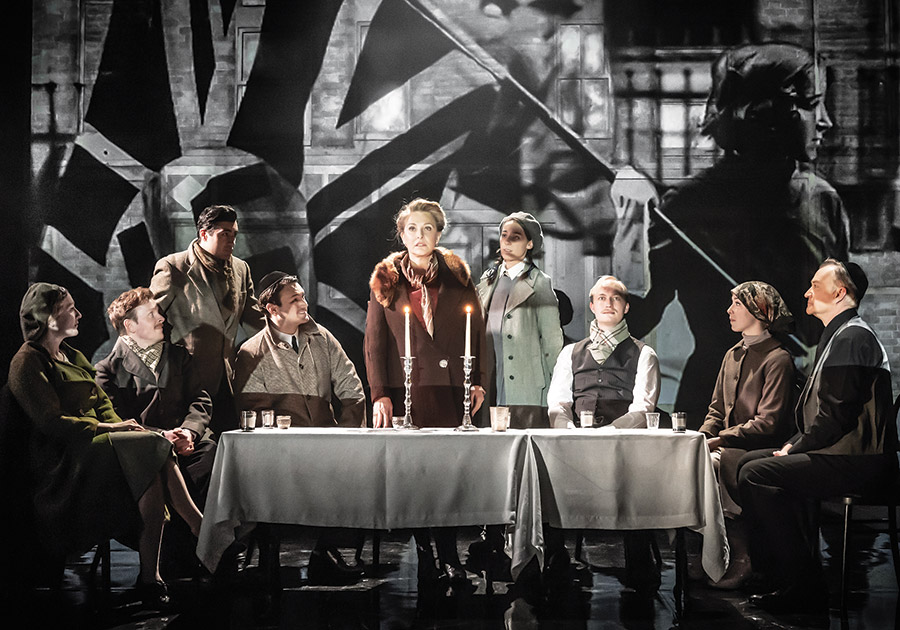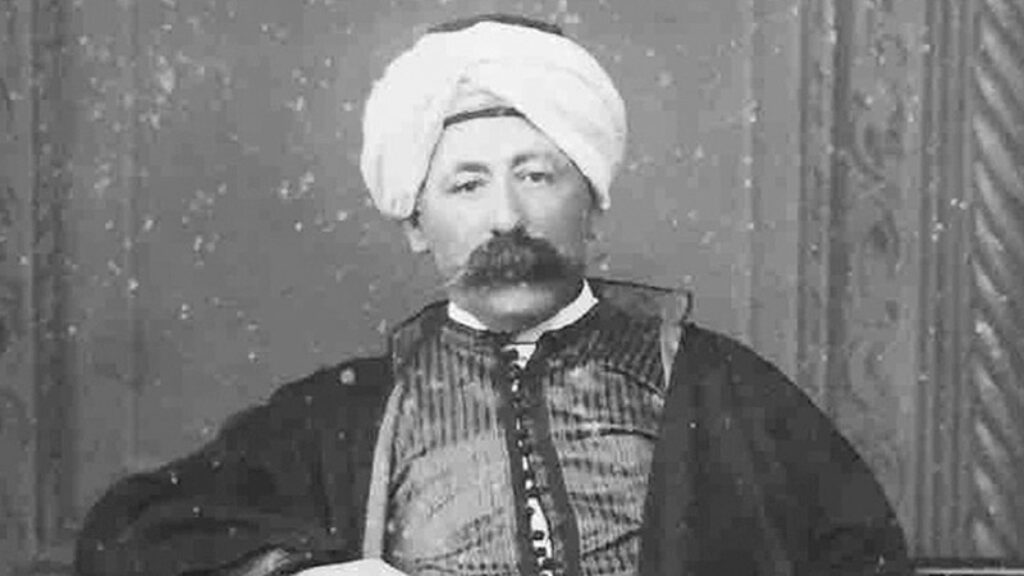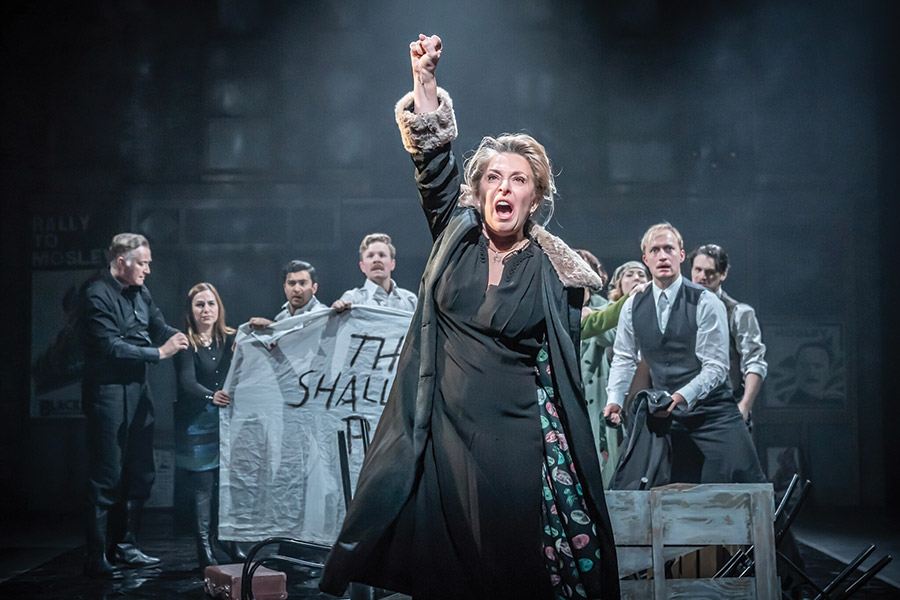Shylock at the Barricades
“Hath not a Jew eyes? Hath not a Jew hands, organs, dimensions, senses, affections, passions?”
We all know that speech of Shylock’s, and few things raised my spirits more in the months immediately after October 7 than the thought that Tracy-Ann Oberman—the first woman to play the role—had taken it to Clifford’s Tower in York. A medieval fortress that sits atop a bright green hill, the tower is the site of one of the most tragic occurrences of mass Jewish martyrdom since Masada. In 1190, the city’s 150 Jews chose death rather than forced conversion or murder at the hands of a mob surrounding the castle.
The week Oberman brought The Merchant of Venice 1936 to Yorkwas Inter Faith Week in York, so Oberman and Rabbi Dr. Elisheva Salamo—the first rabbi to work in the city for more than eight hundred years—were joined by representatives from the Muslim, Christian, and Sikh communities. “I can honestly say that I lost myself in that speech,” Oberman wrote in a moving article forthe Jewish Chronicle. “Even though I say it nine times a week, and always from the depth of my soul, this time it felt different. . . . Shakespeare’s words reaching out to the souls of those medieval Jews murdered at this spot.” She wept, the audience wept, and a flock of doves nesting in the tower started cooing.

Oberman has been touring the country with her Merchant to packed houses, and it just closed a spectacularly successful run on the West End. I saw it a little earlier in Stratford-upon-Avon, that mecca of all things Shakespeare in the heart of what we Brits call “Middle England.” The reviews I had read were uniformly outstanding. I came to the play knowing that Oberman was channeling her bubbe, a refugee from tsarist Russia, in her portrayal of Shylock. I’m also a long-time admirer of Oberman, and not only for her work on Doctor Who, EastEnders, and other British television shows. She has been a prominent campaigner against antisemitism since the Corbyn years and was the inspiration behind Jews. In Their Own Words., a verbatim theatre production that reproduced the experiences of a dozen British Jews with leftist antisemitism. That play was written for London’s Royal Court Theatre in 2022, a year after it had staged a play about an evil Jewish billionaire named Hershel Fink in the last of a succession of notorious incidents, which mired that radical left-wing space in public controversy.
In short, I thought I knew what to expect of this Merchant, and I was looking forward to it. I was wrong.
The play opens with a Seder table. Brachot over the candles, and the Ma Nishtana. The scene feels a bit easy, but it’s an efficient way to touch base with Judaism—and introduce Jews, in their own words, without anachronism. Because once we get down to business, we’re swept into Shakespeare’s sixteenth-century English, that beautiful, rich language at once foreign and familiar. So, to begin with, I’m almost sold on this production.
At first, it kind of makes sense to stage Merchant in the East End of London during the 1930s against the background of rising British fascism. Brits find it too easy to forget that moment and how it felt for Jewish Eastenders like Oberman’s family to watch the rise of Hitler on the continent and see Oswald Mosley’s Blackshirts marching in the streets of London where they lived. Turning the nobles who taunt Oberman’s Shylock into homegrown fascists makes it easy to hate them—and to understand her own loathing for these Jew haters.
The Wednesday afternoon audience in Stratford was elderly and—well—middle English. The kind of people who volunteer in charity shops and historic house museums and whose understanding of the Holocaust is mostly filtered through what their parents told them about the war. As I watched, I wondered how it felt to them to see virulently antisemitic headlines in English projected against a backdrop of bleak charcoal streets, men wearing black uniforms with red armbands and Mosleyite insignia, intermittently (but persistently) the Union Jack. Of course, we all know how we are expected to respond to such things, not to mention the melancholy Yiddish tune that stands in for a lost world.
The play has been cut right back to a snappy one hour, forty minutes with the focus kept trained on Shylock. The supporting cast is good, but she’s the heart of it—and a female Shylock is a brilliant conception. A traditional Jewish woman fending for her family, just like they always did. The Fagin accent fell into cliché, but Oberman’s performance is impassioned and persuasive. She wants—so badly—for us to feel her pain and anger that, for the most part, we do.
Then, in the second half, it all falls apart. Because The Merchant of Venice isn’t a play about racist, genocidal antisemitism, it’s more complicated than that. Shakespeare’s play is rooted in Christianity—the old world, not the new—in which a simple conversion is enough to resolve the entire predicament. His plot doesn’t make sense in 1936 London. Why, to take a small example, is the duke wearing a large crucifix in a courtroom adorned with a British flag, when anti-Catholicism is such a central pillar of British national identity? The problem with all the heavy-handed Nazi echoes is that what seems a compelling conceit actually lets Christianity off the hook.
Shakespeare wrote a comedy in which the uncomfortable fate of the Jew is set against the glamour of Venetian Christian lives; that is the real darkness at the heart of the play. Oberman’s production tells a less complicated story; it is a thoroughly modern and straightforward tragedy told from the perspective of the victim—not just a vicious moneylender but a loving mother as well.
Once she’s been sentenced and banished the play stutters. In a recent interview with the i newspaper, Oberman reflects that in traditional productions, Shylock’s last words are “I am content,” but in her version:
[Shylock] leaves the stage, so the aristocratic morons can carry on for another half an hour going. “Oh! I was a girl and you were a boy! I had no idea! Oh har-har-har!” They don’t care. . . . My Shylock doesn’t leave. She stays on stage as a ghost almost, looking on at all this frivolity. . . . Like a conscience.
There the actress sits on her suitcase, looking less and less like ghostly Shylock and more and more like a 1930s refugee in search of a new home.
Where is all this going? I wondered as I sat there—and then it became horribly clear. Oberman was classically trained (Royal Shakespeare Company, the National Theatre), and it shows in her performance. She is a subtle actress, but the Merchant of Venice 1936 is not the place for that. It isn’t your average Royal Shakespeare Company production; it’s theatre as activism. Before we know it, Shylock is on her feet, fighting fascists in the 1936 Battle of Cable Street—a seminal moment in modern British history—with the rest of her cast. This is confusing; it’s impossible to relate the violent clash of Jews and antifascists with Mosley’s Blackshirts even tangentially to the plotline. But yes, there they are, with historic footage projected on the stage behind them, holding up a large white banner and shouting the words emblazoned on it: “They Shall Not Pass!”
Up you get, they tell us, and the elderly, middle-class audience stands to its feet, shaking their fists in a gesture of solidarity, shouting those defiant words as well. My companion (a Holocaust historian) and I took one look at each other and sat back down (later we discovered that we had both considered walking out). This felt so weird. Two Jews opting out, while everyone else pledged their allegiance to the battle against antisemitism.
We hated it for so many reasons, of which perhaps the most important is this: it turns Shylock and the whole history of European antisemitism into an opportunity for a feel-good moment. Because solidarity is what this production is really about. “Written in the 16th century, set in the 1930s . . . about 2023” in the words of a Financial Times review that were picked out in gold above the Criterion Theatre.
As a British Jew living in the present moment, I can see there might be a place for this. London Theatreland is rarely so welcoming nowadays and Oberman has received death threats for her courageous performance. In February, an Israeli and several other Jews were reportedly hounded out of the Soho Theatre by the comedian Paul Currie, in what audience members described as a scene reminiscent of (yes) the 1930s. We could do with more solidarity, to be frank.
Yet when I contemplate an entire audience in the West End’s Criterion Theatre—Jews, Gentiles, does it really matter?—rising to their feet, pumping their fists, and shouting “They Shall Not Pass,” I feel a deep sense of disquiet.
Suggested Reading

The (Railroad) Baron
How the man who built the Orient Express lost track of his legacy.
The Quality of Rachmones
Howard Jacobson's Shylock Is My Name is dead serious and very funny, high criticism and low comedy.

Us or Them
It all started with a tweet: “Curious about your whiteness? Come to our meeting.” Edelman was curious.

For the Many, Not for the Jew
The anti-Zionism embraced by far-left activists who flocked to Labour after Jeremy Corbyn’s election has merged with ancient European Jew-hatred to create a new and virulent strain of anti-Semitism.

Comments
You must log in to comment Log In